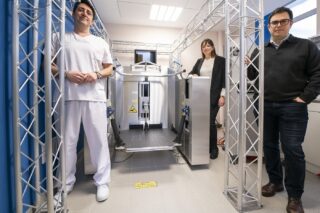As the number of people requiring intensive care keeps increasing daily, hospitals around the world are still struggling with a severe shortage of ventilators. Scaling up production remains complex but temporary collaborations between firms are popping up to rapidly manufacture these essential tools to treat Covid-19 patients.
Covid-19 is a respiratory infection that can cause lasting damage to the lungs. According to the WHO, 80 percent of people will not need to be hospitalized, but one person in six becomes seriously ill and can develop breathing difficulties. In these severe cases, the immune system detects the infection and expands blood vessels so more immune cells enter which can cause fluid to enter the lungs. This makes it hard to breathe, causing oxygen levels in the blood to drop.
A ventilator is used to take over the body’s breathing process when the disease has caused the lungs to fail, which gives the patient time to fight off the infection and recover.
In the UK
In mid-March,the British government called on industry to produce an extra 30,000 ventilators and engineering titans including Dyson and the Formula One team McLaren, stepped up to the challenge. Britain had about 5,000 medical ventilators in stock but the health service said it would buy as many as could be produced to deal with an expected surge in patients who need help breathing. Recently, the first machines made by UK manufacturers responding to this appeal were delivered to the NHS. An initial batch of about 30 Penlon ventilator devices, rapidly adapted from existing designs, were manufactured by a consortium that includes McLaren, Mercedes, Ford, Siemens and Meggitt.

Penlon is one of the few companies in the UK that had the capacity to produce ventilators before the pandemic. It is one of only two remaining companies in Britain to manufacture anesthesia machines and ventilators. The NHS has relied heavily on ICU ventilators and other critical care products manufactured abroad. When the Covid-19 outbreak took hold in Britain, the Oxfordshire-based company turned its attention to adapting their existing designs to meet the specific respiratory needs of Covid-19 patients. Penlon is now making 10,000 new ventilator models for the pandemic adapted from their ESO2 system.
Peter Worrallo, Managing Director at Penlon, said:
“We’re getting professional and expert advice as to how our technologies may be adapted for the treatment of this unprecedented scale of cases. We are all going to have to think outside the box, work together, and in this crisis, forget commercial interests.”
In response to the suggestion that car manufacturers or tech companies could fill the ventilator gap, the company said:
“Typically a new medical device takes two to three years to develop and launch. The idea that an engineering company can quickly manufacture medical devices, and comply with the rules, is unrealistic.”
Ventilators Take a Long Time to Manufacture
The medical equipment company Smiths Group also plans to push out an extra 5,000 of a portable ventilator it already produces at its Luton site. Babcock, a military engineering group, hopes to land a contract to build 10,000 ventilators in collaboration with Dräger, a German ventilator group. The Dyson Group has 10,000 units on provisional order and is hoping to begin production soon. Both of these products are still waiting for regulatory approval.

Ventilators take a long time to manufacture and assemble. Sourcing the electronic components is presenting the biggest challenge. One attempt to plug this gap is coming from a team of scientists at Oxford University who have teamed up with the medical equipment manufacturing company Smith and Nephew to produce a simpler machine that is quick to put together. The product, called the OxVent, is similar to simple ventilators used in operating theaters referred to as “bag in bottle” ventilators. OxVent involves a big, squeezable ball attached to a mask and a valve, and it is made from parts that are already in the NHS supply chain.
>> Read our article about OxVent here.

American Car Manufacturers Involved
Across the Atlantic, the ventilator situation has reached desperation. The US has now overtaken Italy as the country with the highest Covid-19 death toll and needs to solve its ventilator shortage immediately. American hospitals have about 160,000 ventilators, and only about 65,000 of these are suitable for the most severe cases. Eventually, up to 740,000 ventilators could be needed, according to the Johns Hopkins Center for Health Security.
Existing ventilator companies have teamed up with car manufacturers in an effort to produce thousands of additional machines. There is a crowdsourced effort to make functional ventilators out of readily available parts. General Motors plans to begin producing 10,000 ventilators per month by mid-April, and Ford hopes to produce 50,000 of the devices in the next 100 days. The machines will be assembled largely by hand at Ford’s Rawsonville Plant in Ypsilanti Township, Michigan, and GM’s Kokomo, Indiana, facility.










